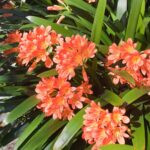Twenty years ago the chemicals that were available to treat pests and diseases were quite nasty. Not only were they unsafe to you and your family but also to the environment. Many have now been banned. There are certain groups of plants, each with their own set of problems, which are almost impossible to grow or keep looking at their best without the need for some spraying. The great news is that the gardener has many safe options available.
Roses
If you choose to grow roses and they are wonderful plants, then you are choosing to spray since almost all roses will need some spraying at some time of the year. Some people with children may well decide not to grow roses or alternatively choose varieties which don’t require much in the way of spraying. ‘Iceberg ‘and its new cousin ‘Pink Iceberg ‘are fantastically resistant.
Black Spot is the worst problem you get in roses, particularly in coastal districts, and the symptoms are predictably black spots surrounded by yellowing of the leaves. Powdery mildew is also a serious disease of roses during humid conditions. Triforine is a low toxicity chemical that you mix up yourself and gives good control of both diseases. If you want the convenience of a spray can and just have a few plants, choose Baycor to clear up these diseases.
Roses also suffer from aphids, thrips and spider mites (two-spotted mite) and by far the best spray for these is PestOil. This newly developed Australian product works by smothering the insect or spider mite, so good coverage is always important.The other good news is that a side effect, although not registered for the purpose, is that PestOil will give some protection against fungal diseases such as powdery mildew and black spot. If you have a real blitzkrieg attack by insects and particularly the larger ones such as caterpillars thenMavrik would be the choice.
Azaleas
If you choose to grow azaleas you are almost certainly going to have to spray. As azalea flowers open they often get a fungal disease which is called petal blight causing the flowers to go brown and rot on the bush. (Healthy flowers fall off the bush when they have faded.)Bayleton is the chemical for this fungal problem and it needs to be made up for use in a sprayer. Unfortunately it has to be applied at weekly intervals during the flowering season. If you’ve got insects like two-spotted mite or lace-bug then Don suggests PestOil. Both of these pests cause an ugly silver discolouration of the leaves so it is worth trying to minimise damage by spraying under the leaves.
Lawns
Lawns are for sharing with the kids, the dog and the cat and so Don prefers not to use chemicals. He believes that if lawns are fertilised in spring and again in summer and treated with a soil wetting agent such as Wettasoil to improve water penetration, they remain healthy and do not need chemicals. However, during the recent drought in eastern Australia many people suffered terrible problems with lawn beetle. So as a last resort to kill both the larvae and adult form of the lawn beetleHortico Lawn Beetle and Slater Killer can be spread around and watered in.
Citrus
The presence of spider webs in citrus trees is a good sign since they are probably cleaning up most of the pests. If you do get citrus leaf curl (also known as citrus leaf miner) or other common pests such as scale or mites, PestOil is a safe and effective solution. For orange shield bugs or Stink Bugs cover up with gloves and sunglasses and pull them off by hand. Alternatively a vacuum cleaner can be used to suck them off (make sure you use a disposable dust bag because they smell terrible!).
Ants, cockroaches, fleas, flies and mosquitoes
A lot of the chemicals you use around the garden are not safe with birds. If you’ve got budgerigars in aviaries, poultry or livestock and you need to control ants, cockroaches, fleas, flies and mosquitoes thenCoopex is very safe and odourless.
Slugs and Snails
Slugs and snails are pests we all have from time to time and they particularly like to devour young seedlings. If you keep dogs you have to be especially careful. Baysol, a blue pellet which now contains a bittertasting dog repellant, should be lightly scattered around the garden as per instructions. Never put it in mounds where animals can eat it.
The bottom line…
If you only ever get one chemical to rid your garden of pests, PestOil is probably the best one. It’s incredibly safe, very effective and no danger to the environment or to the family.
Safe use of pesticides
- only buy the smallest amount necessary
- read and follow the directions on the label
- only spray during the cool and calm of the day
- store in the original container in a locked cupboard
- wear protective clothing
Availability
All of the following garden chemicals should be available at most good nurseries throughout Australia. Coopex is available from aviary specialists and rural produce stores. The following prices are approximate.
Triforine
50ml $10.95
500ml $16.95
Baycor
350g pressure pack $9.25
PestOil
750ml trigger pack $10.95
500ml for making up $12.95
Mavrik
200ml for making up $9.95
Bayleton
150g powder for making up $9.25
Hortico Lawn Beetle and Slater Killer
600g shaker pack $4.95
Coopex
25g sachet $7.95
Baysol
250g $3.95
500g $5.95



